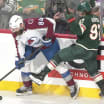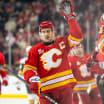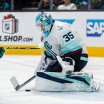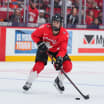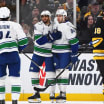Until Wednesday, Las Vegas was no different to George McPhee than it is to tourists around the world.
McPhee has been to Las Vegas before for a title fight, a family vacation and the occasional work trip. Now he gets to call The Strip his new home, even if he plans to be traveling for three weeks of every month for the next 10 or 11 months.
McPhee was named the first general manager of the NHL's new franchise in Las Vegas on Wednesday, putting him in command of the hockey operations for a team that doesn't have a nickname and can't have players until June 2017, but is off to a strong start with a billionaire owner, a state-of-the-art arena, and a GM with 24 years of experience in the NHL, including 17 as GM of the Washington Capitals.
George McPhee wants Las Vegas to compete right away
GM discusses challenge of building team from scratch, selling hockey on The Strip
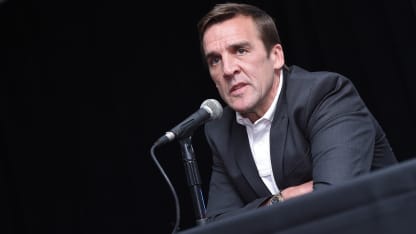
© Ethan Miller/Getty Images
"Las Vegas as a city is already a great brand," McPhee told NHL.com in a phone interview. "People all over the world know where Las Vegas is. We'd love to build a great hockey team in Las Vegas. We'd love to make it a destination for hockey fans and for hockey players."
To do that, McPhee and his new boss, owner Bill Foley, have to build a team from scratch. In many ways, McPhee will get to live a general manager's dream. Instead of being hired to fix problems created by someone else, he gets to make his mark on a clean slate.
"We're hoping that with every decision we make, with every person we bring in here, someone is going to say, 'These guys mean business,'" McPhee said.
McPhee discussed with NHL.com how he plans to create a hockey legacy in Las Vegas. Here is that conversation in Q&A form:
Let's talk about this challenge. How much different is this than anything you've done in the past, and what excites you about this challenge?
"Other than the initial building of it, which should be fun and is something I'm sure all GMs would like to do when building a team, have an absolutely clean slate, I've just been overwhelmed by the number of people interested. There are certainly lots of qualified people. The issue won't be trying to find qualified people, it's going to be of these many qualified people, which ones are the best fit? That's the early challenge in putting it together. Once we get through expansion draft and the first draft, then it's the same for all GMs, it's drafting and developing properly and managing people and managing your team. The other element is it's a brand new market and it's up to us to educate the market, to grow grassroots hockey, to make people aware of the game and really enjoy it and help them understand it."
It's interesting because you mentioned once you get to the expansion draft and then the regular NHL Draft, but that's 11 months from now. You can't have a player for this team for 11 months, so between now and 11 months from now, what are you doing?
"That 11 months is going to fly by, absolutely fly by because we are going to be so busy putting a staff together and then strategizing and trying to execute on that strategy in the way we're going to scout both the amateurs and the pros. It's going to be a lot of work, not to mention everything we have to do in house to get our offices and everything like that set up. But this time is going to fly by. We're not going to feel like we have enough time."
Bringing up the offices and getting that set up is interesting too, because it's not a little thing, it's a big thing, it's where you work. How do you go about setting up a front office? What are the initial steps, other than just hiring some scouts?
"It's all right from scratch. Today is: How do people get a hold of us? Where do they reach us? What's our address? What are our phone numbers? Today is the little things. We need phones. We need computers. We need credit cards. We need all the nuts and bolts. What can we offer people in the contracts? What kind of healthcare plan do we have? What kind of pensions? There are all those things, and then there are the big things, like trying to hire these people, and how do we deploy them? It's a scouting staff initially, and then the rest of the front office. The thing is, though, you can hire scouts but you better have some computers for them and you better have some scouting software built into those computers."
Have you talked to anybody who has done this, colleagues of yours who have gone through this before, be it [former Atlanta Thrashers president] Don Waddell or [Nashville Predators GM] David Poile, to seek advice on building an expansion team?
"Oh yeah, sure. I talked to [former NHL GM] Doug Risebrough years ago about it. I talked to David Poile. Don Waddell checked in. Oh sure."
What have they told you?
"David Poile says it's fun and managers will all be really nice to you this year because you're not competing against them. Don Waddell is the one who said it's going to fly by."
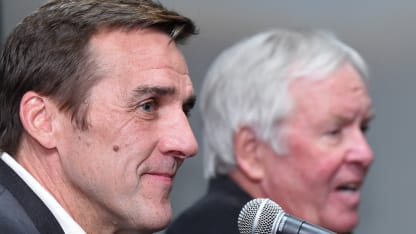
© Ethan Miller/Getty Images
As someone who is a competitive person, what do you think this season is going to be like without a team or rooting interest, when you're used to being with a team and having a rooting interest?
"I think I'll have a rooting interest, but it's not for teams, it's for individuals. You'll identify someone in an organization and say, 'You know what, we have a good feeling about that guy.' It's sort of like the entry draft, when you're out there and you find someone and he's the guy you're hoping to get, that's fun. When you can walk away from a game and you've identified a player you really like, you start projecting and start thinking, 'Boy, we hope we can get him.' I think there is going to be a lot of that this year, and it's not for seven players in seven rounds. This is for 30 players. It's actually both. It's 30 players one day, and a couple days later it's another seven players in the entry draft. It's going to be a lot of work."
How do you feel about trying to sell hockey in Las Vegas, which absolutely has to be a part of this?
"That will be tremendous fun, tremendous fun. Talking with the fans has always been fun. When you have a captive audience and you can talk hockey and explain the nuances of the game and what makes the game so special, what the things are that look easy but are really hard to do, that's fun. The interest level in Las Vegas is so high, and they really sold a lot of tickets again [Wednesday] after the press conference, that we're delighted to be able to sit down and talk hockey with the fans."
Are there plans set in place to do that, have fan forums, so to speak?
"Yes. That was one of the questions and one of the requirements, I guess, in the interview process, are you willing to step away from scouting a few nights a month to meet the fans and talk hockey? The answer was absolutely. We want to sell out every night for many, many years."
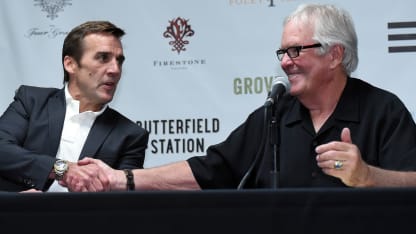
© Ethan Miller/Getty Images
Why did you and Bill Foley click?
"I like him and he likes me. I knew eight minutes into the first conversation that I wanted to work for him. We've all been watching what's been going on in Vegas and I've read a lot about Bill, but the enthusiasm when I talked to him on the phone, it was inspiring. He was so excited about what they had accomplished so far and made you just want to be part of it. It was about the positivity and the optimism of what can be accomplished. And the way he explained the job, saying, 'The manager is going to make the decisions. I want to be involved, but you're the expert and you're going to make the decisions.' Those are the things that appeal to a general manager."
Your experience in Washington, when your team there had to rebuild, can you take any part of that experience and bring that to this job?
"Oh yeah, it's very similar. We tore down a playoff team and just took it right down to the wood. Early on, we hardly had anybody playing, we were just trying to fill boots. I actually think we will be a little further ahead than we were in that process. So, I'm familiar with that experience and what it's like. It's hard. You don't get a lot of respect from other teams or the referees or anyone. I'm hoping that going through it again, we'll build a team that's good enough, plays hard enough and is talented enough that we do get respect and we turn it into a real good team quickly."
Do you anticipate the arena helping to attract players to Las Vegas?
"This is a market and set up of a franchise that is really going to appeal to players. There are 40 million people that visit Vegas every year. We've got 700-plus players in the NHL, of which 80 to 100 are elite players, and maybe less than that, maybe 50 to 60. We only need five or six that want to come to Las Vegas. We only need five or six. We have a fabulous rink. We have a fabulous practice facility coming on line in a great neighborhood. It's easy to get around. It's beautiful weather. There's no state tax. The travel is going to be much easier than it's ever been in the West because we've added another team. And the building is going to be sold out. So why not try to put a team together that can try to make the playoffs in the first year? We're going to be smart. We're not going to do anything silly, do bad deals or anything like that, but can we get a really good, competitive team with some really talented young players right away. Yeah, I think so."




